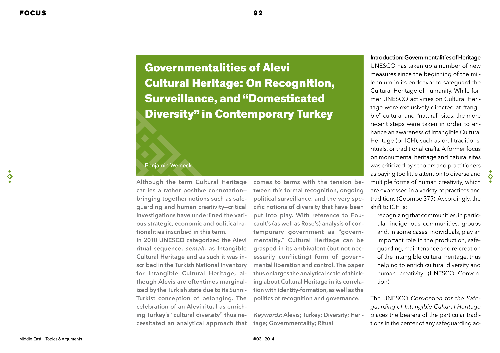Governmentalities of Alevi Cultural Heritage: On Recognition, Surveillance and "Domesticated Diversity" in Contemporary Turkey
Although the term Cultural Heritage carries a rather positive connotation—bringing together notions such as safe-guarding and human creativity—critical investigations have underlined the various strategic, economic and political rationalities inscribed in this term.In 2010 UNESCO categorized the Ale...
Gespeichert in:
| 發表在: | Middle East - Topics & Arguments |
|---|---|
| 主要作者: | |
| 格式: | Artikel (Zeitschrift) |
| 語言: | 英语 |
| 出版: |
Philipps-Universität Marburg
2014
|
| 主題: | |
| 在線閱讀: | 在線閱讀 |
| 標簽: |
添加標簽
沒有標簽, 成為第一個標記此記錄!
|
| 總結: | Although the term Cultural Heritage carries a rather positive connotation—bringing together notions such as safe-guarding and human creativity—critical investigations have underlined the various strategic, economic and political rationalities inscribed in this term.In 2010 UNESCO categorized the Alevi ritual sequence, semah, as Intangible Cultural Heritage and as such it was inscribed in the Turkish National Inventory for Intangible Cultural Heritage, although Alevis are oftentimes marginalized by the Turkish state due to its Sunni-Turkist conception of belonging. The celebration of an Alevi ritual as enriching Turkey's "cultural diversity" thus necessitated an analytical approach that comes to terms with the tension between this formal recognition, ongoing political surveillance, and the very specific notions of diversity that have been put into play. With reference to Foucault's (as well as Rose's) analysis of contemporary government as "governmentality", Cultural Heritage can be grasped in its ambivalent (but not necessarily conflicting) form of governmental liberation and control. The paper thus enlarges the analytical scale of thinking about Cultural Heritage in its correlation with identity-formation, as well as the politics of recognition and governance. |
|---|---|
| DOI: | 10.17192/meta.2014.3.2164 |
 Publikationsserver
Publikationsserver